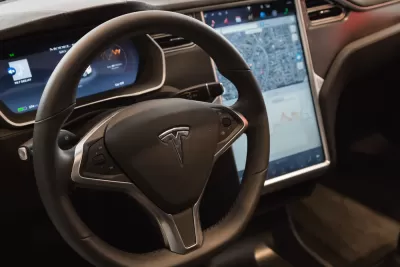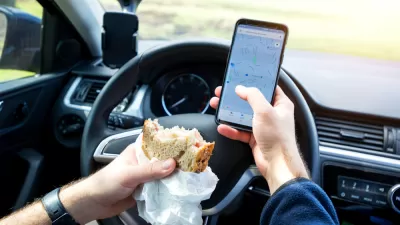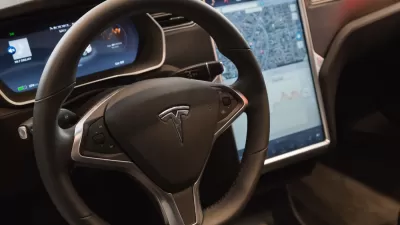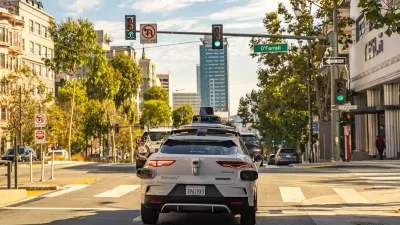In the wake of multiple fatal crashes involving Tesla's self-driving mode, ethicists suggest the need for a robust set of regulations governing the testing of AVs before more of them hit the road.

Tesla, which "has been offering customers access to a 'Full Self Driving' beta software, allowing Tesla owners to effectively become guinea pigs for the company's tech" for years, "is now under investigation by the National Highway Traffic Safety Administration (NHTSA) for several crashes where the Autopilot system was engaged." James McCandless reports on new research "that explores the intersection of human behavior and automated driving features in production and future vehicles."
According to Dr. Bryan Reimer, research scientist at the MIT Center for Transportation, "the push towards autonomous driving is a balancing act between what autonomous vehicles can do versus what a driver is capable of doing in conjunction with that technology. The goal is to take some of the more routine driving tasks out of the hands of the driver." Because humans, by nature, tend to become over-reliant on automation, "Reimer says that autonomous systems should be seen as a collaborative part of driving in helping drivers make moment-to-moment decisions." But drivers using Tesla's Autopilot and Full Self Driving modes "have become less attentive on average," leading to the multiple crashes seen in the last year. To Reimer, these repeated incidents raise ethical questions about the efficacy of 'self-driving' modes. "Once we understand a situation," he says, "it becomes foreseeable misuse." Reimer suggests a more cautious approach to autonomous testing and a need for "third-party validated scientific data."
"[T]he uneven nature of autonomous vehicle testing is partly down to the absence of a relevant regulatory environment." According to Reimer and Dr. Nicholas Evans, professor of philosophy at University of Massachusetts-Lowell, autonomous cars need "a regulatory body similar to the Food and Drug Administration (FDA) that can oversee the development of these technologies and insure that they're being safely tested and used."
The benefits of increased oversight, says Evans, "outweigh any reductions of speed in testing cycles," and "there should be more dialogue about the ethical implications of who is affected by more self-driving vehicles on the road and the unintended consequences."
FULL STORY: Ethical Standards for Self-Driving Car Testing Are Still in Their Beta Stage

Study: Maui’s Plan to Convert Vacation Rentals to Long-Term Housing Could Cause Nearly $1 Billion Economic Loss
The plan would reduce visitor accommodation by 25,% resulting in 1,900 jobs lost.

North Texas Transit Leaders Tout Benefits of TOD for Growing Region
At a summit focused on transit-oriented development, policymakers discussed how North Texas’ expanded light rail system can serve as a tool for economic growth.

Why Should We Subsidize Public Transportation?
Many public transit agencies face financial stress due to rising costs, declining fare revenue, and declining subsidies. Transit advocates must provide a strong business case for increasing public transit funding.

How to Make US Trains Faster
Changes to boarding platforms and a switch to electric trains could improve U.S. passenger rail service without the added cost of high-speed rail.

Columbia’s Revitalized ‘Loop’ Is a Hub for Local Entrepreneurs
A focus on small businesses is helping a commercial corridor in Columbia, Missouri thrive.

Invasive Insect Threatens Minnesota’s Ash Forests
The Emerald Ash Borer is a rapidly spreading invasive pest threatening Minnesota’s ash trees, and homeowners are encouraged to plant diverse replacement species, avoid moving ash firewood, and monitor for signs of infestation.
Urban Design for Planners 1: Software Tools
This six-course series explores essential urban design concepts using open source software and equips planners with the tools they need to participate fully in the urban design process.
Planning for Universal Design
Learn the tools for implementing Universal Design in planning regulations.
Ascent Environmental
Borough of Carlisle
Institute for Housing and Urban Development Studies (IHS)
City of Grandview
Harvard GSD Executive Education
Toledo-Lucas County Plan Commissions
Salt Lake City
NYU Wagner Graduate School of Public Service





























